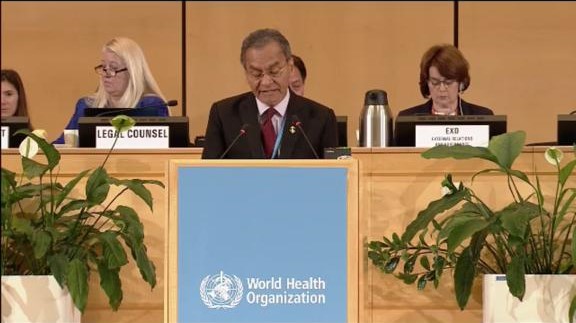KUALA LUMPUR, May 22 — Health Minister Dzulkefly Ahmad told the World Health Assembly how Malaysia planned to strengthen universal health coverage so that everyone can access quality health services.
The Amanah leader said the Pakatan Harapan (PH) government would improve primary health care for non-communicable diseases and mental health, besides implementing programmes like the Peka B40 health screening programme for the poor.
The government also planned to fortify public-private partnership through the Health Advisory Council; address the sustainability of the tax-based health financing system; overcome the challenges of monitoring and evaluating universal health coverage; and use data analytics in health care through the MyHealth Data Warehouse.
“To attain universal health coverage (UHC), we must always be reminded of the vulnerable and under-served population,” Dzulkefly said in a speech at the 72nd session of the World Health Assembly, the decision-making body of the World Health Organization (WHO), in Geneva yesterday.
“This segment of the population needs to be treated with respect, as access to health is a fundamental human right. We recognise that UHC is about equity and access to health care services for all, without them incurring catastrophic financial hardship.”
The PH administration launched the Peka B40 programme last month so that the bottom 40 per cent (B40) can do health screenings for free at private clinics, in a bid to curb the rising rate of diseases like diabetes and cancer.
Dzulkefly noted that Malaysia scored 70 per cent in the UHC service coverage index according to the 2017 Global Monitoring Report on Tracking Universal Health Coverage.
He admitted that Malaysia’s out-of-pocket expenditure reached 38 per cent last year, higher than the WHO recommendation of 20 per cent.
Dzulkefly explained to the World Health Assembly several challenges that Malaysia faced in sustaining UHC, such as increasing cases of both communicable and non-communicable diseases; an ageing population; heavier workload in public health facilities; a lack of financial and human resources; continuous maintenance of health facilities, equipment and information and communication technology (ICT) infrastructure; and lack of capacity to monitor and evaluate the implementation of UHC.
“‘Health for all’ should be the frontier of all development efforts. Malaysia joins hands with the WHO and member states in championing Universal Health Coverage, focusing on the quality of care to be better than before, stronger in implementation and smarter in partnerships; for our present and future generations,” he said.
WHO’s theme this year is on universal health coverage with the tagline “health for all”, which means everyone can access quality health services without financial hardship, starting with strong primary health care.








